#meta?? I guess this can be a meta
Text
Personally, I imagine that Black Butler would be rather bland without the undertone of sebaciel. The psychosexual aspect of sebaciel that permeates the entirety of the relationship between Ciel and Sebastian genuinely helps to broaden the world around them and the ways in which they interact with it, especially Ciel as we already know about the trauma regarding sex and his body that he has.
It also adds a layer of depth to Sebastian that takes him from being a “stereotypical” demon to a multifaceted character that could potentially see Ciel in a romantic light that deviates from his shown nature of using sex as a method of perfunctorily gathering information. This also ties into the ways in which Ciel is still his means of nourishment while simultaneously providing an undercurrent of emotional stimulation that typically wouldn’t be associated with demons. (especially since we already know demons can express familial and platonic feelings, i.e. Hannah, Alois and Luka).
#I’m just yapping here but!#kuroshitsuji#sebastian michaelis#ciel phantomhive#sebaciel#meta?? I guess this can be a meta#black butler#yana toboso
209 notes
·
View notes
Text
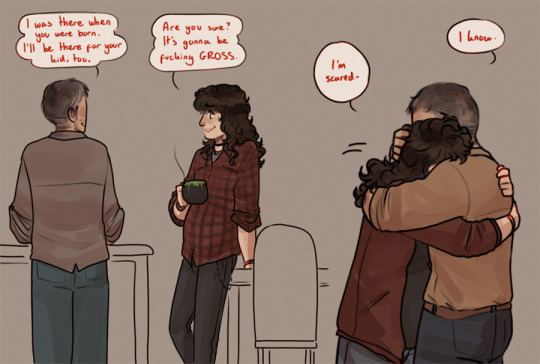
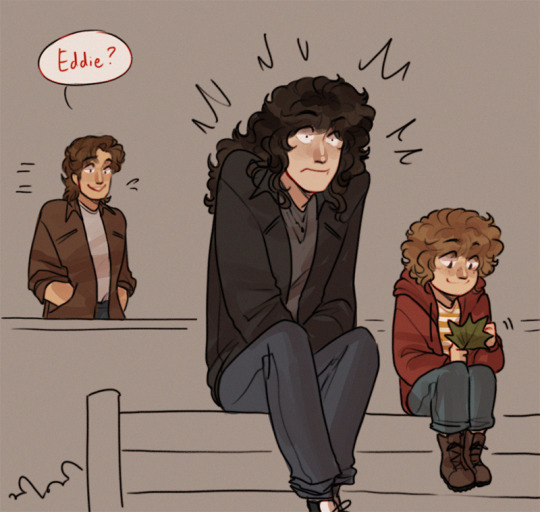

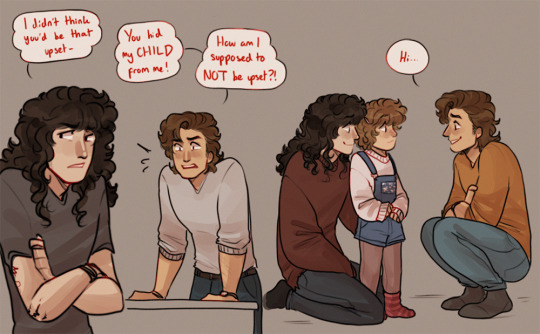
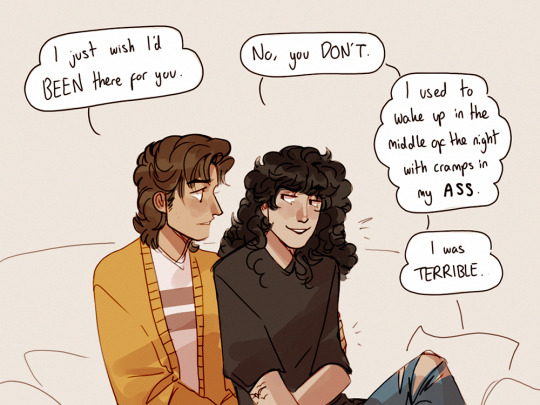
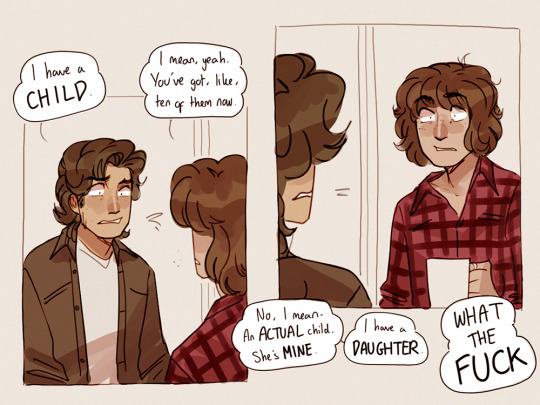
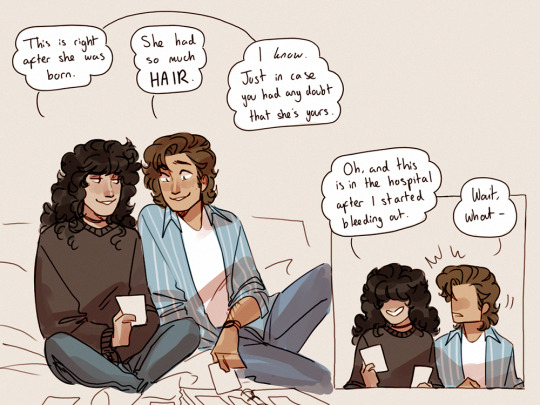
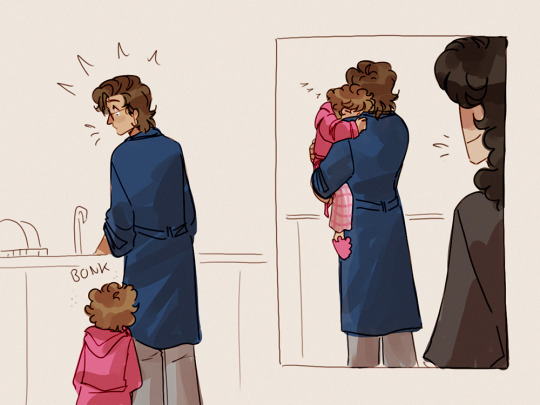

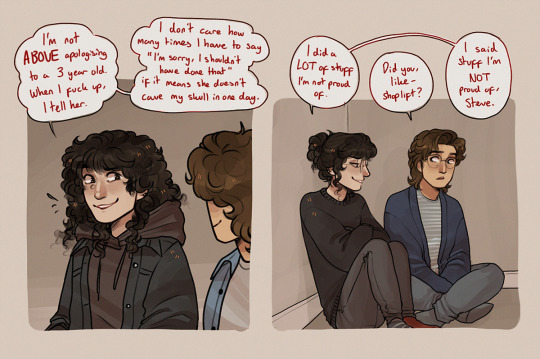
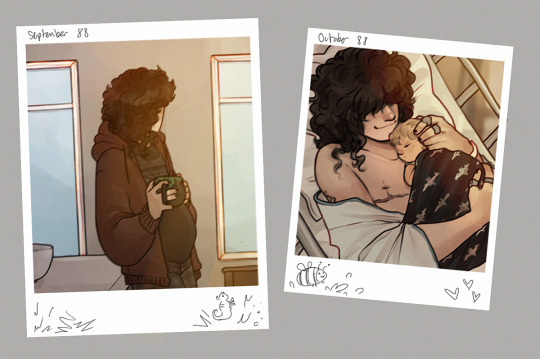
just realised i never posted any of the stuff i did for the alternative steddie dads au
#steddie#stranger things#steve harrington#eddie munson#we're getting meta#this is the alt version where bee was the product of a one night stand and eddie skipped town and never told him#the original was too wholesome i guess#also you can tell i made some of these months apart#ft. uncle gareth seeing through eddie's bullshit#i was just going to post the newest ones but you need. context. there's lore now#i am insane
7K notes
·
View notes
Text
There is a theory that the way children play serves as a means to simulate and prepare them for the tasks they'll take on as adults. So for all the narrative weight both Jinx and the story give the boxing machine at the arcade it would never have prepared her or the kids to take on Piltover.

What are the two things that Piltovans excel at over their Zaunite counterparts to keep the hierarchy? Weapons and technological development.

When you look at the way Piltovans invest in their children, they don't prioritize hand to hand/melee combat training. Piltovans focus on giving their children experiences in handling firearms, a pursuit that is both leisure sport for the wealthy and a key offense against dissenting Zaunites.
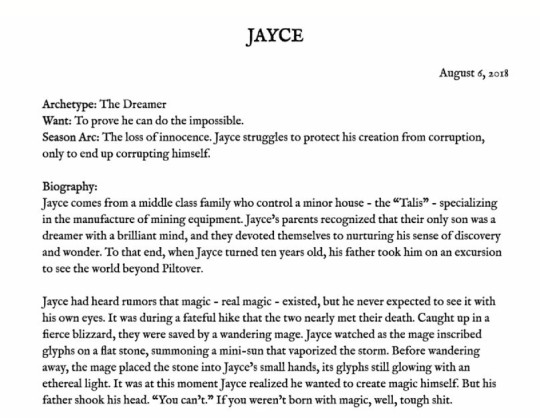

And from the show notes even Jayce, whose family occupies the upper middle class, was sent on educational excursions across Runeterra to explore the world and learn what it had to offer. Without Jayce's education abroad he would never have been inspired to pursue the concept hextech.
It's no wonder that the two figures that are set to be Piltover's biggest threats from Zaun are Jinx and Viktor, becasue they engaged in the same kinds of games and activities as their Piltovan counterparts.

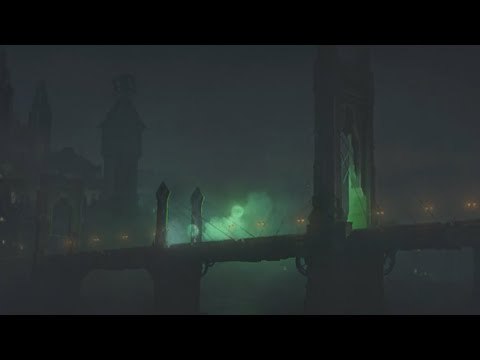
Jinx didn't have an entire forest preserved to help her practice her sharpshooting like the high houses of Piltover, but she did excel in the few games at The Rift (the arcade) that built on her talents. She's the only Zaunite thus far who's long distance offensive is a strong counter to Piltover's forces.


Viktor couldn't travel the world like Jayce did, but for better or worse he managed to stumble into an opportunity to get real opportunity in research not offered to his peers through Singed. It was through that experience that Viktor knew to turn to Singed when he was at the end of his rope, and the consequences of that will be fully realized in season 2.

Ironically, the kind of skill the boxing game champions is only good for keeping other Zaunites in line. Vander's days of fighting Piltover were way behind him when we first met him, and Vi spends season 1 primarily fighting other Zaunites. It's no surprise the Zaunites who embody the old ideal of strength in Zaun that the game portrays, Vi and Vander, are largely at the mercy of Piltover and end up collaborating with them to avoid further harm.
Zaun's future as an independent city-state couldn't happen if they stuck to their old ideals. The people who stand a chance against Piltover are the ones that not only succeed but excel at playing Piltover's games against them.
#arcane#arcane meta#jinx arcane#vi arcane#caitlyn kiramman#jayce talis#viktor arcane#i also imagine silco heavily invested in jinx's technical education once he took her in#vander ensured the kids were warm safe and loved but he wasn't planning on advancing them or zaun in anyway like silco was#i guess there's also a parenting metaphor in here about the way a parent can harm their children based from their own trauma and ambition#i also think it's interesting that the boxing game kept score for the players and immediately ranked them for all to see#but the shooting game didn't do that instead players had to manually track their own score against each other#who knows how many kids in zaun actually know math that well to keep up with the game and their competitors#the boxing game also has more space in the arcade and is more centrally positioned for other people to view and admire the plaayers#there's more incentive in zaun for kids to play the boxing game rather than shoot
498 notes
·
View notes
Text
Grian had taken her aside quietly. He'd awkwardly talked around the idea of her remembering now; apparently, he didn't know if her victory counted. She'd rubbed the back of her head and hadn't quite realized what he was talking about and said something about the games and, ah. Apparently she does remember now. Apparently the victory counts. Apparently this means he needs to say sorry.
Cleo considers not accepting the apology. Grian would get the wrong idea then. If she said: you don't need to apologize for shit, or maybe, there's nothing to apologize for, he'd take that as: you are exactly as bad as you're convinced you are. Honestly, Cleo's not sure whether that means Grian would decide he'd done nothing wrong or everything, but that's besides the point.
She'd never not remembered, is the point.
Frankly, Cleo hadn't realized people were meant to be not remembering. She's honestly a bit embarrassed not to have figured it out. Surely that can't be right. Cleo has held every single slight and every single ally and every single person she has ever connected to right in her ribcage, next to where her carved-out, unbeating, torn-up heart lies, the entire time these games have gone on. Each game, a new fact carved into the bone that makes them up.
Names ribbon around her memories. Bdubs and the Crastle and Scott and soulmates and Pearl and friend-turned-foe and Etho and survivor and Bigb and traitor and Scar and son and everything else. She wouldn't be the same at all if she didn't remember. Everything she is, it's built on top of everyone that was.
Maybe it's a zombie thing. The undead are said to be memories that can't fade as much as anything else, after all.
But she can't really explain this to Grian, of course. If nothing else, that would require explaining the place he's taken next to her heart, too, and frankly, that's way too mushy for the both of them. What ends up coming out her mouth is: "Oh. Does that really change anything?"
Grian stares at her a moment.
"You know, I guess not?" he says.
"Right then," Cleo says. "Cool. Good to know my victory means nothing then."
Grian squawks. "You can't just say it like that! That's depressing!"
Good enough.
She buries 'not-supposed-to-remember' 'not-sure-if-it-counts' 'laughing-as-scott-dies' and 'I-have-always remembered' in the same place in her ribcage, so she won't forget it, and then she does the thing that sets her apart from the common zombie:
She moves on.
#trafficfic#trafficblr#real life smp#(and all the rest)#zombiecleo#a bee fic#so okay the thing is my cleo character meta/understanding DOES NOT WORK with 'only victors remember'#because traffic!cleo is a character that ONLY works through the steady build across series#maybe more than anyone else cleo holds onto things across each series and ESPECIALLY relationships#and none of them can really be taken without the full context#so this is just me having fun with that i guess#ENJOY.
1K notes
·
View notes
Text
what i love about laios is that he's actually very good at putting puzzle pieces together BUT HERE'S THE THING 1) he needs to HAVE the information, and 2) (this is important) he needs to KNOW it is information he should care about
and i think this could be said of anyone but the thing with laios is that people tend to view his lack of awareness wrt social etiquette and memory problems as pure indifference and/or obliviousness; sometimes they misinterpret his motives based on their inaccurate expectations of him and therefore don't give his thoughts on a subject the credit he deserves
one of the most obvious examples of this happens at least twice in the manga as i remember it, but the most recent incident was when they were trying to resurrect falin. there's a moment where laios mentions reconstructing both of the warg skeletons, as their bones are mixed in with hers. both chilchuck and senshi balk at this, with chilchuck complaining aloud, questioning laios' priorities,
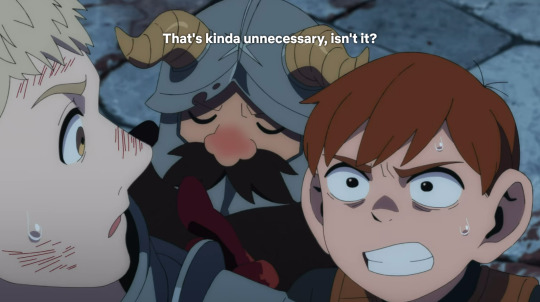
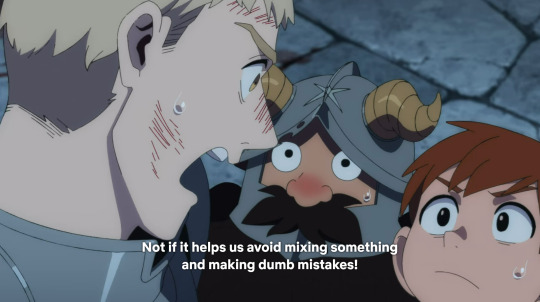
and laios quickly, angrily retorts. his reason for making the suggestion is perfectly logical and practical, but because his friends are used to his interest in monsters influencing his judgement, often in ways they see as frivolous or dangerous, they don't come to the same conclusion. one which i'd argue is kind of obvious considering the situation
we see it again during his fight with toshiro, where toshiro demands to know what laios plans to do to save falin. laios takes a minute to answer, but he DOES answer, following the logic that if falin is a chimera because of (and controlled by) the mad mage, then the logical next step is to confront/defeat/usurp them
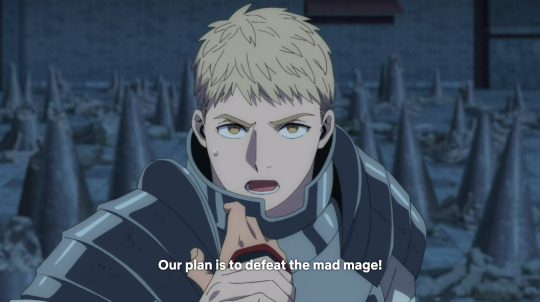
then in the following episode, when chilchuck brings it up again, laios explains what he (now) knows about thistle, mentioning that he's the same elf that laios saw in the living paintings, which is why he knows thistle's connection to delgal. the party reacts like this:
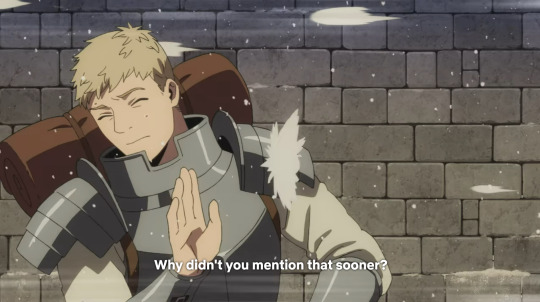
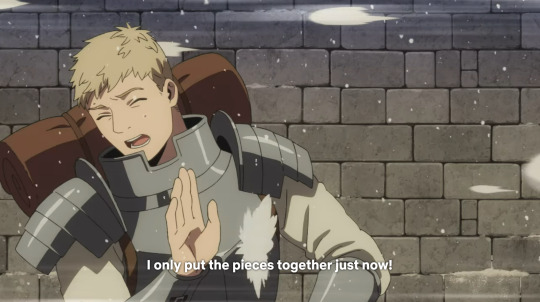
i'd say this is an example of them feeling frustration over laios' habit of having 'bad timing', not knowing when or how to speak at appropriate moments. theyre judging him for not saying something earlier, as if he already knew all this but didn't think to mention it when it was relevant, when the reality is that laios only just now had all the pieces he needed to understand the full picture
and i mention this bit specifically because i think it's a great way to explain what i mean by point 2: laios needs to know when information is important and worth considering
which, again, feels fucking obvious. but as someone who ALSO has debilitating issues with remembering important shit, i find this particular element of it pretty relatable and critical to my overall point. it's not laios' fault that he didn't know who thistle was or his significance - why the hell would he assume that a person he met in a living painting, presumably long since dead in reality, should be someone who's face, name, or motives he keeps in mind?
ultimately, i guess what i'm trying to say with all this is that the way others treat laios' intelligence is not congruent to how actually smart he is. one of the things i love most about laios, what is possibly his biggest strength and the reason he is such a great protagonist, is that laios is willing to think things through and find the most logical conclusion to a problem, no matter how outlandish or dangerous or seemingly impossible that conclusion may be. sister got eaten? race back down to go get her. can't afford food? fight, defeat, and eat dangerous monsters. sister's fully digested? use black magic to bring her back. now she's a chimera? defeat the mage controlling her and use that power to fix it.
anyways. what was even my point with this post? i guess it is that laios is smart, at least as smart as anyone else in the cast, arguably smarter than some. he is intelligent and utilizes that intelligence in many ways, not JUST when it comes to monster info (though that is his best and sexiest brand of knowledge)
and also please be nice to your friends with memory problems. it's rough out here for forgetful bitches
#banebabbles#dungeon meshi#dunmeshi meta#cant remember if that's my tag for it. oh well#this post is kinda messy but it's fine it doesn't matter#i just had to express some thoughts after rewatching some eps w partner#i was fumbling w my closer but i guess it really is just that like#i have a lot of feelings about anyone calling laios dumb or dense or totally oblivious#bc he's not. he just doesn't think The Same Way as the other chars and also#is at a DISADVANTAGE. bc of the AUTISM. can you believe it#he gets taken for granted and others' perceptions of him influence how they treat him in lots of way#including his intelligence. unfortunately. and you hate to see it
432 notes
·
View notes
Note
what's the threshold theory
There was a post about how Tom is the only crew member who isn't really affected by the Borg, and there's a theory that he has so much luck because he saw the past and the future when he crossed the transwarp threshold. He saw the past and the future, all of time and space. There's some subconscious part of him that remembers that experience. In fact, Tom refused to play a part in Chakotay indulging Annorax's temporal incursions, probably because a part of him knew nothing good could come of it.
If we extend that same theory to Janeway, some of her wild luck with time travel and other crack plans starts to make sense. She doesn't verbally hate time travel until after the events of Threshold, since it happens in Time and Again without complaint. Janeway has an uncanny knack for time travel, as evidenced every time she deals with it. She hates time travel, but it might be because part of her knows exactly how to manipulate the timeline. She manages to avoid the "inevitable" temporal explosion in Future's End, saving both Voyager and Braxton. She resets the entire timeline in Year of Hell, and no one else followed her reasoning. She pulled it off flawlessly. In Relativity, she senses the incidents are all related, despite it being just one reading that connects them. By the time she's involved, she has a temporal incursion factor of .0036 and a time travel protocol named after her, even if that may just be Braxton's personal grudge. Then there's Endgame, where she intentionally changes the timeline. Up until this point, she has been dragged into time travel, but for the first time, she jumps in on purpose. How does Admiral Janeway know how to get them home sooner in a way that completely avoids the Temporal Integrity Commission? It's because she has seen all of time, and part of her knows exactly what needs to happen so she can get Voyager home and do it in a way that becomes baked into the prime timeline. Maybe she doesn't consciously remember what happened during her transformation, but the experience lives in her mind somewhere, guiding her decisions.
#every day is threshold day#tldr threshold cemented the time travel shenanigans#we're not counting her disparagement of time travel in relativity i know it's technically before threshold#but they've messed with the timeline so much that her past timeline is also changed.#Time travel is funny because the past is the future the future is the past#so while relativity comes before threshold in the prime timeline her timeline has also been changed in a way that it wasn't before threshol#we could chalk it up to a writing oversight but this is more interesting#not to mention her uncanny luck with the Borg which I think ties in as well#it's part of why her instinct is so strong#also the bio neural gel packs but that's a different theory#listen she's amazing with or without having seen all of time and space but she has seen all of time and that must have affected her somehow#those little salamander babies also have all of the cosmos in their mind#tried to explain as concisely as possible but it is part of my overarching theory#she doesn't second guess herself nearly as much following their jaunt into transwarp#I have more but I'm trying to be brief cause it's written up partially in my drafts somewhere and i have some things i need to do today lol#meta#Star Trek voyager#Kathryn janeway#threshold day#did you expect me thresholdbb to not have a serious threshold theory?#listen I can make anything nonsense and turn anything into a serious theory I was known for this kinda bs in grad school#I wrote a 25 page paper on NOTHING once#I wrote a paper about how corn fields were super gay and it made my professor cry I can spin the bullshit it is one of my skills
481 notes
·
View notes
Text
Why I feel like Ka/taang is one-sided, despite textual evidence
ATLA does try to convince us that Katara has romantic feelings for Aang. For example: she seems thoughtful when she realizes that Aang is a powerful bender; she’s offended that he didn’t want to kiss her in the Cave of Two Lovers; she gets jealous when Sokka says On Ji and Aang look good together.
So…what’s wrong with anti-Kataangers? Do we just lack media comprehension?
To be clear, on their own, these gestures can indicate romantic interest. But at the same time, we have stuff like “Aang is a sweet little guy, like Momo.” We have her ambivalent facial expression after he kisses her before the eclipse, and her hedging during Ember Island Players, and her anger when he kisses her anyway. In the context of these conflicting cues, Katara’s possibly romantic reactions can absolutely be interpreted in a different way, because:
Acknowledging a friend as a potential romantic interest is not the same as actually being romantically interested in them. (Imo this is something young women struggle with, due to a combination of romance-centrism and heteronormativity that make women feel like they should be in romantic relationships, and that boys and girls who share intimate and deep feelings for one another must be romantically into each other)
Wanting someone to find you desirable is not the same as desiring that person. (Which is something a lot of women, especially young women, struggle with. Remember all the discourse around Cat Person back in 2017?)
Being jealous when someone flirts with your friend is not the same as wanting to be with your friend. (Especially when you see your friends as family, or if you’re accustomed to a specific type of devotion from that friend. It is jealousy, and it is possessiveness, but it doesn’t always arise from romantic feelings)
Growing up in a patriarchal society means that your desires are always filtered through what men want from you, sometimes in an abstract male gaze-y way, and sometimes in a very visceral and interpersonal way when a boy wants you specifically. And Katara’s reactions are just that — reactions. Reactions to what other people — including Aunt Wu, Sokka, Aang himself — have insinuated about her and Aang. She’s not really proactive in her interest in Aang: we don’t really see Aang, romantically, from Katara’s POV. Under the framework of “Katara is reacting to a romantic prospect she’s kind of uncertain about,” it is completely plausible — and indeed likely — that she would sometimes act in ways that indicate romantic interest, in addition to moments where she indicates the opposite.
Ka/taang shippers often bring up other evidence, like Katara’s despair when Azula hits Aang with lightning, or how protective she is of him when Zuko joins the Gaang. The thing is, these pieces of evidence aren’t necessarily indicative of romantic love. The fact that Katara genuinely loves Aang makes the whole thing more complicated, not less, because — especially at that age, especially when Aang is twelve years old and grew up in a sex-segregated society of monks — it is really difficult to tell the difference between platonic love and romantic love. Their mutual devotion is layered and complex yet straightforward in its sincerity. What was not straightforward, until the last five minutes of the show, is whether this devotion on Katara’s end is romantic. The romantic arc for Katara and Aang is not really an arc, as Sneezy discusses in this classic ZK video. Katara actually becomes more conflicted over time and we never see an event that clarifies her feelings. She seems more interested in him in The Headband than on the Day of the Black Sun, and she has never been more hostile to his romantic overtures than in the penultimate episode.
And in light of this, it’s pretty easy for fans to fill in the blanks with a different interpretation: maybe Katara’s weird expression after their kiss at the invasion means she didn’t enjoy it; maybe the kiss made her realize that she doesn’t actually feel that way about Aang; maybe against her will and her better judgement, she’s developing feelings for another person, a person who hurt her and whom she fervently tried to hate until he pulled off what is in my opinion the greatest grovel of all time in the form of a life-changing field trip. Maybe. Am I saying that Zutara has more romantic interactions than Ka/taang? Of course not. But ironically, the lack of romantic interactions means that it’s not inherently one-sided, the way Ka/taang became in the latter half of season 3.
I’m not arguing that Katara’s unequivocally not into Aang. Obviously the text declares that she is, because they get married and have kids. But I am saying that there’s a very good reason that so many people, especially women, see Katara’s interest in Aang as ambiguous. It’s not because we can’t pick up “subtle” hints of growing affection. It’s because we know not all affection is romantic, and it’s really easy for someone else’s insistent romantic intentions to muddle what you want.
P.S. I first started thinking about these topics (platonic vs romantic love, desiring someone vs wanting to be desired, etc) in the context of compulsory heterosexuality, a term describing how queer women contort themselves into relationships with men even if they’re not really into men. I saw a post a few days ago joking about why so many queer women seem to be into Zutara. I wonder if part of the reason is because as queer women, we are very sensitive to the ways in which we can talk ourselves into wanting things we don’t actually want, and Katara’s romantic interest in Aang can be easily seen that way.
#Anti Kataang#Zutara#anti Bryke#Katara deserved better#From Bryke who offered her so little romantic agency#I actually think Aang and Katara’s mutual devotion is really compelling because the wires get crossed when you have such intense love#And navigating romantic vs platonic feelings can be very complicated and interesting#but no we did not get that bc I guess they just had to end with a romance however shoddily developed#my meta
506 notes
·
View notes
Text
see i can never get over 999knw because why does orv establish right after he's introduced that:
he believes his mistake is what killed the 999th turn's yoo joonghyuk
he thinks maybe he should've died before they even met
and now he's aware of the current turn, where these two things are true:
yoo joonghyuk is alive
kim namwoon is dead
imagine believing you're at fault for everything that went wrong and thinking maybe you’d be better off dead
and then ending up in another timeline that essentially confirms it.
you were right! you should have died back then. don't you think so too, captain?
#orv#kim namwoon#orv spoilers#can you hear me. it's so dark in here#orvposting#this isnt even getting into how he thinks jihye blames him too (obviously just projection. but why. why would you think that#shaking him like a soda can#also on some meta level#omniscient reader’s viewpoint is kim dokja’s story right#I guess it tracks that it would be particularly cruel to knw#(...so he escapes being a character in the end. he can still have a happy ending despite it all...!
446 notes
·
View notes
Note
i'm so curious about your character gender reads now tho 👀👀
(You enter the kitchen and see me, eating shredded cheese out of the fridge by the handful)

(I turn around to face you.)
Hi. Do you want me to sell you on amab NB Siffrin? I'm going to try and sell you on amab NB Siffrin. And maybe even a little bit of tranfem siffrin and/or loop. as a treat. just for you.
So, (I put the cheese back in the fridge.)
This read of mine comes from a number of things, a lot of them to do with the game's themes, and to do with Siffrin being a narrative foil to the other characters. And Vaugarde as a whole.
(READMORE WARNING: THIS IS LIKE 6K WORDS LONG. YOU ALL SHOULD KNOW BY NOW I DON'T MAKE POSTS WITHOUT UNCONSCIOUNABLE AMOUNTS OF EVIDENCE AND EXPLANATION. IF ANYTHING I'M BEING RESTRAINED HERE. THUMBS UP.)
(Pre-readmore note: this is in response to me having given an analysis of how I personally percieve Sifloop in relation to asexuality and shipping. Which you can look at here. (x))
It is however, not what my like, no-holds-barred no-rules just-for-me headcanon for Siffrin would be. (which is intersex 'head empty no thoughts' siffrin, for the record). This is instead my close-reading-of-the-text-and-themes interpretation of Siffrin.
This is why I'm gonna be saying Read and not Headcanon, to distinguish the two. (Anything I consider a little bit too much of a stretch vis a vis interpretive hard reads I will call a headcanon. But those are for the last bit of this post.)
Unlike *gestures at mass media* All That… ISAT is already packed to the gills with queer rep, to the point where I feel no need to grasp at straws and make overextended reaches into obviously unintended subtext. Like with, y'know, most media. Since here, the subtext isn't unintended. Like this isn't a Transfem Metal Sonic or Aroace Ash Ketchum situation where I know none of the evidence is on purpose and I'm just having fun making a conspiracy theory pinboard out of it. This is like… There's intentionality there. And I want to engage with it on its level, see what the text itself suggests. It's my personal preferred method of expressing deep respect to a text. (Not that it has to be anyone else's, obviously. This is just my way of showing I love a work.)
So yeah, I am, in general, very interested in hearing hard-fought arguments when it comes to interpreting texts. I'm glad ISAT has a lot to pick at here, and so, I will.
(and since not a lot of texts ever have anywhere near this kind of depth in this arena, i don't wanna squander it… i'll try and keep my own biases as in check as i can, and already have done by hashing quite a bit of this interpretation out with two people of very different gender identities to mine. To put it mildly, binary-aligned or transfem I am very squarely Not.)
(Now that the cheese bag has been removed from the equation, I drop this framing device, sit you down at the table and begin to dredge up evidence from below it.)
Okay, so. What are my like… Core reasonings here? I think I can split it into three categories. Broadly, with an amount of overlap, so bear with me…
SIFFRIN AS A FOIL AND CONTRAST TO MIRABELLE, ISABEAU AND THE CHANGE RELIGION AS A WHOLE.
SIFFRIN'S HABITS OF CLINGING TO 'KNOWN QUANTITIES', SCAPEGOATS, AND THEMES OF RACIAL IDENTITY INTERSECTING WITH GENDER IDENTITY.
SIFFRIN, LOOP, DE-PERSONING, DEHUMANISING, APATHY AND SURVIVAL.
Okay so up top I'm going to split my argument for Siffrin's gender identity Present and Future here. This means, for now, I'm arguing for AMAB NB Siffrin alone. The transfem stuff is for later (and more for loop, in my mind, too).
I have a few direct observations of the text here that set things up. Here are the things in-game that make me assume that Siffrin, as of the start of the game, has not yet undergone any radical change to their identity in their life. Not on purpose, at least. These are ordered in a messy but logical flow, so uh, try and keep up. I'll synthesise at the end. I Prommy.
SIFFRIN AS A FOIL AND CONTRAST TO MIRABELLE, ISABEAU AND THE CHANGE RELIGION AS A WHOLE.
CHANGE & THE UNIVERSE: PERCEIVED OPPOSITES
When interacting with most objects in the Changing Room in the house, they express a genuine curiosity toward body craft. It seems they are legitimately unfamiliar with it on a deeper level than having simply heard of it.
Despite this curiosity (explicitly stating they've previously wondered about it), they dismiss it as too much work early on in the game. These points combined seem to suggest to me that they have never previously sought out any kind of real change to their appearance or identity. Either for gender reasons, or other body dysmorphia reasons. (Which, despite the dismissal, they do refer to their body as a 'meat prison', which is not particularly positive) However...
This changes in Act 3. In acts 3 and 4 they flatly state: "You're thinking about crafting your body. You seem to have all the time in the world now." While still never spoken aloud, their declining mental state corrosponds with a worn-down, almost nihilistic reckoning with the feelings they masked with the 'meat prison' joke in act 2.

[Image: Interactions with the change craft textbook in acts 2 and 3/4.]
In talking to Mirabelle, they are very self assured that one can stay the same/be comfortable with their born identity. They also seem a little unsettled by the change religion's flippancy in general, which makes sense, as they have been clinging to the famliar (even when painful) to cope with other traumas. (More on this later, section 2)
The Universe Faith appears to heavily disincentivise Wanting for oneself and other expressions of Free Will due to safeguarding against Wish craft. This seems to have impacted Siffrin's mental state majorly, even if they do not recognise it. The followers of the faith are (if Siffrin is to be believed) incentivised to 'go with the flow' and take paths of least resistance, and those that DO make big decisions will tend to justify things as being The Universe's Will.
(See: The King's entire Modus Operandi, and the way Loop (and Siffrin) do the same rote actions, constructing worldviews (the play analogy, the Universe's Will) and justify that as what the Universe Would Want (despite a total lack of evidence to prove as such))
As such, it seems as if a follower of this faith as neurotic as Siffrin would be unlikely to act upon any Wants to Change Themselves without a lot of turmoil and backwards-justification. (Of note, Loop's forcible change coinciding with a dropping of pronoun. But that is again for later, section 3) As of the start of the game, they do not appear to have broached this kind of turmoil directly.

[Image: Act 5 interaction with the star journal, emphasis on it being a cautionary tale against reckless usage of wish craft, instilled so deeply to be a children's bedtime story]
Siffrin, in act 5, grows frustrated with both The Universe and The Change God, feeling abandoned by the former. They struggle with simultaneously anthropomorphising the Universe as a cruel onlooker, while also seemingly acknowledging them as a cold, almost scientific fact of nature. This would heavily imply that the 'blame' put upon the Universe by Siffrin in these moments is known to them, at least a little, to be potentially meaningless. It seems that somewhere in Siffrin's belief system is something, be it the core or merely a creeping worry, that the Universe is not a thinking, feeling, thing. And thus that their invocations of "The Universe's Will" are merely rationalisations of random chance and consequence. This is in DIRECT contrast to the Change God, proven to be an emotive sapient entity, who merely refuses to offer a helping hand. (Similar sentiments are, too, spoken by the Change God itself.)


[Images: Interacting with the window in the observatory in act 5, text from the change god meeting]
So. These are the bulk of my observations when it comes to how Siffrin is positioned in contrast to the Change Belief. It would seem to be that Siffrin, inkeeping with their role as an outsider, is a complete fish out of water in Vaugarde's change-centric world. This makes sense! It makes them a compelling foil to the Vaugardians in our cast, and allows the Vaugardians to challenge Siffrin's worldviews merely by existing. It also, more importantly, makes Siffrin an interesting lens through which to inspect our two most Change-driven characters. Mirabelle and Isabeau.
MIRABELLE.
Mirabelle and Siffrin's differing faiths are put on display the most frequently. Interactions like the circle key and the party's disbelief of Siffrin's facts about the stars make this clear. These interactions other Siffrin from the group further, and are another avenue through which Siffrin can ignore their own needs, not communicating with the party and allowing them to dismiss things he deems important.
Obviously, the friendquest is primarily about Mirabelle's struggle with her aromanticism and asexuality. But there's an implicit undercurrent of gender there too. Mirabelle has never made a big change, not like Isabeau. She has never 'changed completely', by her words. And Siffrin distinctly finds this an odd thing to be worried by. Whatever culture he carries has no pressure to explore these avenues, it seems. Siffrin is able to help her by sharing their honest opinions, that he's never felt the need to change these things, and he's happy (allegedly). Why should she?

[Image: Mirabelle's friendquest text]
Siffrin is not thinking particularly hard when he first does the friendquests, they are just being themselves. By positioning Siffrin as this unchanged yet confident object, they are in the perfect position to help Mirabelle by being in her almost exact position, both sexuality and transgender status (albeit, with the caveats of potential alloromanticism, and a they pronoun), that they become her ideal foil. (And in fact, the subtle differences between their positions in canon add to this, showing a display of Perceived Genuine Truth, rather than simple in-group camaraderie)
Whereas…
ISABEAU.
When Mal du pays speaks as Isabeau, it says the following;

"I don't want to know someone who won't even try to change, who luxuriates in things staying the exact same like you do."
I don't want to know someone - Shame of being known, that's Isabeau's insecurity. Reflected back at Siffrin, who has become the worst thing imaginable to each of their friends, in Siffrin's own mind. He absorbs their insecurities like a sponge and incorporates them into himself. Empathy turned ill.
Who luxuriates in things staying the exact same - Now THAT'S interesting. This is not Isabeau's insecurity, it's Siffrin's own. But also, it appears as if, Siffrin, whom to Mirabelle was unflappable in that not changing was alright, has internalised some of her worry. That it is MDP's Isabeau saying this, though, shows this is about Personal Change, perhaps even Specifically Gender and Self Image, rather than Mirabelle's spiritual side.
Isabeau and his distinct change in personality and gender, to become someone who he actually likes… Diametric to Siffrin, who has been stagnant for a long time, presumably as far as they can remember. It would seem to imply they have no recourse against this argument. Siffin becomes, in his mind, the opposite to Isabeau, a man he deeply admires the bravery of when told the story of his Change.
These are Siffrin's words against themselves, that they consider themselves to have never even 'tried' whatever it is they think Change to be.
So. These are my main points vis a vis: Siffrin as a foil. This reading would posit that Siffrin's He/They status is, well, almost accidental? Which I would imagine befitting of them. They are, at the start of the game, still the mysterious rogue who never elaborates upon anything. They aren't going to be correcting a they/them from a teammate who is likely far more cautious about assumptions.
Notably, Mirabelle excludes Siffrin from the label "man" in the bathroom monologues… But as does Siffrin when in the prologue poem room. Though one needs remember, Siffrin only expresses these thoughts internally.

[Image: Bathroom conversation featuring Isabeau identified as the party's singular man]

[Image: Prologue!Siffrin expressing that they are not a man in very certain terms.]
While I do wonder what Mirabelle's knowledge (or lack thereof, potentially! Did Siffrin actually divulge this to her, once? Or is she making assumptions again?) is here, this is pretty clear evidence that Siffrin doesn't see themselves As A Man. (that, and Adrienne's word of god "fella" comments). I'm sure you can see where I'm going with this… but.
The thesis here is, that Siffrin may want to explore their gender further; doesn't feel connected to Masculinity, and yet, keeps that He pronoun around? Well, the Universe does not, in Siffrin's mind, really allow for personal wants and desires. If their friends start they/themming them, then cool. They like it, but never requested it, so it's the Universe's will.
But, asking? Making decisions and requests and rocking the boat? That seems to scare Siffrin a lot. It seems to scare them so much it causes a lot of, if not all of, the conflict in the game. I feel like it's a fair deduction that this aversion to humour their own desires pervades a lot of their existence.
Plus, I think there's meat there. By only allowing Siffrin to reckon with any potential desires to change only after growing closer with the family, you get to explore things like "How does Mirabelle feel that even the person who said she didn't have to change is changing." and the slightly less potentially harrowing (OR MORE, IF YOU WANT IT TO BE? IDK. I'M NOT YOUR BOSS.) "Isa's continued changing allows Siffrin a space to explore it, maybe even just by proxy, or maybe by joining them."
But mostly, this section is about how Siffrin not having Changed Yet makes them delightfully strong narratively; allowing them to relate to Mirabelle, and get cold feet when comparing themselves to Isabeau.
I love this as a narrative strengthener. It's very rare in media that we get to explore a nonbinary character's thoughts and insecurities on whether or not they're "doing enough" to be nonbinary. Even less so Aligned nonbinary people. And reading that alignment and insecurity through the lens of a nonbinary person not fully disconnected from their assigned gender at birth? It's a very compelling exploration of a very common and raw and yet underdiscussed feeling, much like the rest of ISAT. I think this is an extremely potent element should it be read this way, and is only strengthened when taking Siffrin's other themes into account.
Speaking of which.
2. SIFFRIN'S HABITS OF CLINGING TO 'KNOWN QUANTITIES', SCAPEGOATS, AND THEMES OF RACIAL IDENTITY INTERSECTING WITH GENDER IDENTITY.
HOLDING ON TO WHAT YOU KNOW. (OR KNOW THAT YOU DO NOT.)
I explained above many of my thoughts on the Universe Faith, and trying to keep these two sections separate was difficult, but needed to be done for the sake of clarity. But this section and the above are deeply intertwined.
Siffrin… Holds on to the things they know. They do not know much. But man do they fucking hold. And yet, paradoxically, they are also avoidant about it.
It is made clear in the text, to the point where I really don't feel the need to rehash it here, that Siffrin's disconnection from their homeland is incredibly painful, but that they consider that culture utterly and irreplaceably important to them.
They cannot face it, it is too painful. They cannot let it go, it is too important.
Knowing what we know of the Island's irl inspirations (though, word of god, the exact location is not supposed to matter, one can infer it from the text (and I did! within reasonable proximity!)), Siffrin is of an indigenous peoples of some description, more than likely. And at the very least, Siffrin carries with them inherent biases and ignorances that show that Vaugarde's conceptions of things don't quite mesh with their own. Bowing to the Vaugardian way of things could very easily be seen as assimilation, in this way.*
And identity? Gender? Presentation? Role? All of that has a cultural element. There's no telling what specifics Siffrin has lost in that arena, and that's the problem. Neither do they. How paralysing, the feeling, to know that should you change yourself you risk unknowingly erasing another piece of home? I wouldn't blame them for locking it off. Keeping their old clothes, keeping what little they can remember of themselves… It doesn't seem to me a conducive or safe mental space to get experimental.
And the Universe makes for a perfect scapegoat. As referenced in the section above, a lot can be justified should you call it "The Universe's Will", because who's there to call you on it? Hardly anyone.
Your divine right to Freeze A Place In Time; Your Deserved Punishment for Wanting to be Loved: All of it the Universe-- If you want it to be.
And thusly, if the Universe wanted you to be a certain way, wouldn't you already be? Wouldn't it make you so? (Wouldn't it take away your body, that which makes you human? If that is what it thought of you?)
So best to put it out of your mind. Wouldn't want to accidentally wish anything.
But as the game itself puts it, personified by The King, you cannot stay mired like this forever. As Loop themselves puts it, they can "get so fixated, sometimes." At some point they need to allow themselves to grow in whatever direction they need, because in the end, they need to live their life. They don't need to abandon their country, their culture, but they can't let it restrain them either.
(* MASSIVE CAVEAT: im white as fuck boyyy. i cant say shit. im like technically Of The Land im like 90% pictish or something ridiculous like that so my particular line has never moved anywhere but. this is notttt something i have input or insight on. this is all gleaned from reading and listening to indiginous perspectives from wherever they may be. i am simply trying to infer from what the game gives us without inserting my own feelings on the matter.)
3. SIFFRIN, LOOP, DE-PERSONING, DEHUMANISING, APATHY AND SURVIVAL.
Alright, here's some less heady and purely-thematic points to round things out. And where we'll also address the fucked up star being in the room; Loop.
My last couple of reading points are the most potentially-transfem to me. Or at least the ones that really hammer home, to me, a seeming lack of want to be masculine-aligned.
ANOTHER NOTE ON THE 'NOT A GUY' THING.
Obviously, there is the aforementioned "Not a man/not that you're a boy" thing. This is rather straightforward, but also still pretty ambiguous. You can be masc-aligned and still Not A Guy. But it does seem to be of note that being a guy very much does not seem to be a goal of Siffrin's. I would posit this in direct contrast to… Isabeau.
But not Isabeau's masculinity. I would instead hold it up against Isa's femininity.
ISAT, as a text, has its characters have genuinely different levels of security in their gender identity, and Isabeau, despite still having insecurities, seems super chill on the gender angle specifically! Their internal strife comes not from their 'not feeling like a man enough' or 'hating being a woman', but instead from their self perception as a friendless nerd! Something that seems to be only tangentially related to Isa's gender, really?
The big dumb bruiser thing is certainly aided by being a dude, but Isa still seems completely comfortable referring to themselves with feminine language, calling himself a "mother hen" (prologue) and having "the heart of a fair maiden" (cookie snack time). (However, they also take being excluded from Mira's girly book club as a surprised compliment, implying they weren't expected to be excluded, and find it affirming.) And even further so, Isa states they want to continue changing further and exploring their identity more, being rather blatant that they might lean back into femininity (and more importantly, let themselves be outwardly smart again), since they're starting to feel hurt by everyone assuming they ARE genuinely stupid.

[Image: Prologue Isa calling himself a mother hen]
And man, this is such a breath of fresh air vis a vis representation. I don't think I really need to explain that. A character who's gender identity is driven by chasing euphoria, even if it started out by trying to drive out misery. Isabeau's character is so damn good. But this essay isn't about him, so get back in the crate, boy.
... So here we have Isa, who is genuinely comfortable reclaiming things about their birth gender, and Mirabelle who loves her traditionally feminine traits to the point where she feels a little guilty that she isn't rejecting them to foster change. And then we have Siffrin… who seems to reject masculine language…? Hrm… (… And then we have The King. A Masculine Title. Someone who Siffrin increasingly sees themselves in and deeply, deeply dislikes this.)
APATHY AND SURVIVAL
It should be clear by now that I see Siffrin's core character as being driven by avoidance and survival. This seems to lead to a lot of apathy, brushing off emotions that are too intense or events and occurences that are too painful. (See: just absolutely everything with Bonnie)
It's all Siffrin really seems to be able to do to Survive. They've travelled, seemingly alone, for what would be around a decade by what the game says about the island's disappearance. They've lived alone on the road as a traveller in a country that so openly welcomes strangers that THE KING and his whole motives can happen. Siffrin is avoidant and refuses to acknowledge problems or strive for help and comfort.
So. That line about the dress. Let's unpack the line(s) about the dress.
THE DRESS LINE, AND THE WAY IT CHANGES BETWEEN PROLOGUE, ACT 2, AND ACT 3.

Good god where to start with this. Full disclosure, the first draft here was way more vague in how I approached this line because I remembered it (and another line, I'll get to it.) way more tame, but going and getting the screenshots..... Siffrin. Buddy. We gotta unpack this.
In act 2, we have "You haven't worn a dress in forever!". This is a neutral, if seemingly a little joyous statement. All we really glean from this is the information that Siffrin at some point, wore 'a' dress. No real inferences there. (Maybe you could say that the singular as opposed to plural makes it more likely that they borrowed/only owned One Dress rather than owned several? But that's a massive stretch...)
Then, act 3/4 shuffles this off into a more general "You wonder if you'll ever wear different clothes again." Which is a more despairing and distant statement. Considering Siffrin seems to travel with only the items they can carry, and owns sleep clothes... It's unclear how many changes of clothing they have. The party seems to consider the cloak a pretty permanent fixture, anyhow. But this line doesn't really say much aside from 'oh god i'm losing myself to the time loop malaise'
NOW THE PROLOGUE. Prologue Sif, buddy, pal, Loop, if I'm allowed to call you that....
Thousands of loops in. We are wistful for specifically dresses. You've forgotten almost everything. You dream about someday seeing the sun again. To be anywhere but here. You want to wear a dress again.
I. Kind of do not know what to do here but point at it. Like I said, my first draft had me half-remembering the progression of this line and as such I was far more vague on what I thought it could imply. Instead this is just straight up yearning.
To, try and segue back to what I had initially written, we'll pick up here...
Siffrin expresses a want to wear other clothes, explore changing their body... But instead, they wear a ratty old form-covering cloak that keeps them warm and safe and is a last reminder of home. They are shapeless, formless, hiding their face under the brim of a wide hat. They do not voice their desire to wear a dress aloud. They once again, keep a desire to themselves, because they do not allow themselves to want publicly. Apathy is safer. Apathy and quiet means you do not risk retribution or hurt.
While I do not think the above is exclusively a transfeminine feeling, it really, really reads like one when taken part and parcel with assuming Siffrin has denied themselves prior exploration.
... And here I have to break my first draft again. I was being, once again, restrained in my reading when writing this. Because I had convinced myself I had maybe straight up imagined one of the lines I was basing my reads on, because I couldn't find it. Because it was a line that read so strikingly desolate to me that my brain had slotted it in during Act Five, meaning when I went looking for it neither me nor my friends could find it.
It's in acts 3 and 4. It's a line I already brought up.

"You're thinking about crafting your body. You seem to have all the time in the world now."
good fucking christ. sorry to break the academic tone but Jimminy Fucking Willikers, Siffrin. What's with that bit. The resignation and despair and guilty comfort we know the timeloop brings them, bleeding into the gender.
This. *taps my finger harshly on my desk* THIS, this feels transfem. this feels so wildly transfem to me. The knowledge that they've never changed before this line lends. The admission that they've been holding back because it's 'too much work'. I spent a lot of time during the game relating Siffrin not to myself but to my friends.
If I'm honest, really, truly, I'm not all too often in Siffrin's shoes. I'm the stable one, of my group. I'm the rock people ground themselves on. And I see so much hesitance, all the time. Denial of joy because what if it's taken away, again? Or futilely out of reach? It hurts more to try, and to fail, than to never try at all.
I wanted to shake Siffrin by the shoulders this whole game. Grit teeth beg them to accept help because for fuck's sake people are clearly offering it get it through your skull--
*coughs* Ah. Ahem. Right. The uh, academic tone.
Right. What I mean to say is, this read as transfem to me because of the way it relates to real-world experiences of denial. And this combo of the Dress line, and the progression of the Meat Prison line, the constant evidence of never having strived for what they want, and that insistance that you're not a man, seem to dislike being percieved as a man, but not being able to shed the outward signifiers?
Individually, yes, these points can be read in different ways. The total opposite ways, even, I'm sure! But as a gestalt it feels really, really transfem. Even if yeah, sure Vaugarde is a magical setting where being transgender is accepted, and this hesitance, specifically, around gender, might not 'make sense' in 'the lore'...
Diegesis isn't everything. Sometimes something that reflects a real-world feeling is important, even if it doesn't 'mesh' with 'the lore' of the world.
TANGENT: DIEGESIS AND READING INTO NON-REAL-WORLD-SETTINGS.
This is a Watsonian vs Doylist spectre that's been haunting this whole argument. In-universe (Watsonian), Vaugarde has seemingly no discrimination between genders, sexualities, and a lackadaisical approach to most things in the arena. Reading our own patriarchal/heterosexual/amanonormative/perisexist society unto it does not make sense, not in this context.
In the real world, however (Doylist), ISAT is a text made in our prejudiced society. A text that is distinctly flavoured by those bigotries which it is kicking back against. Because of this, it is not the whole story to simply read the text while discarding our real-world-informed inferences. Isabeau is a big example of this. While perfectly accepted in Vaugarde, he is very obviously a revolutionary character in our real-world space! He has so much to say, specifically BECAUSE things about him that are not readily accepted here, are accepted there! Same with Mira's struggles, and yes, Siffrin's too.
ISAT was written with the knowledge of how it would play against our real world in mind, we know this, clearly, from many an interview. This is most present in how it engages with asexuality and aromanticism (and immigrant identity), but make no mistake, it influences the Whole Text.
Ergo, just because I view certain writing choices here in the context of Our Real World Perspectives On Gender and not Vaugarde's In-Universe Perspectives, it does not make them an invalid read. They are simply a Doylist read.
There's been an admittedly loosey-goosey lack of delineation here between things I'm reading with either lens, because for the most part all of these points have been a vague synthesis of both that I can't quite decouple. Unprofessional, I know, but I'll admit to not having written my thoughts down like this in a good long while. Usually I just hash this out verbally over discord voice to a small number of weirdo literature and classics student friends who are willing to humour me. I'm an arts student too, but animation hardly required I actually write an essay to a literature degree's standard. Lol.
DE-PERSONING. AND LOOP. OH JESUS . LOOP .
Siffrin de-persons themselves a lot. I say de-person rather than dehumanise because, well, there's a subtle difference there. Siffrin doesn't see themselves as vermin or an animal or an object, but they do seem to see themselves as lesser, not requiring the respect they grant others. They aren't, you know, a 'real person'.
People get to have things like thoughts and wants and identities. Siffrin is, at best, Just Siffrin. They have what they have and they don't ask for more and they don't (CAN'T) feel too strongly on what they do have!
When Loop at first offers their pronouns they offer the Royal 'We'. This is at least a little bit, a joke. A nudge toward their true identity, a potential dig at themselves for becoming so understanding of The King. Mostly though, a joke on the first thing…. and a sign that they do not see themselves as a separate entity to the Siffrin stood before them.
When Siffrin rejects this, they settle for they/them. Loop drops the he/him, presumably partially to cover their tracks, but… They just showed their hand with the 'Royal We', and if you wanted to go even further with this, there's no way for us to know whether Loop is treating this pronoun as singular or not. They presumably are, but it is still a potentially plural pronoun.
Loop… Clearly does not see themselves as a person. It's, I would say, a completely reasonable assumption that the form they have taken reflects implicit feelings toward themselves as less than a person, an actor, a monster, a tool, a means to an end. They are rendered inhuman by The Universe, frivolous distractions removed. No mouth, inventory and clothes confiscated, nothing between the legs. Formed roughly in the shape of a person to allow them to do their only job: Help.
Loop's body does not make logical sense, given their continued ability to sleep, dream and their continued habit of deep breaths to self-soothe. It would seem to me, it was made in the image it was, with only the tools it needed to Help Siffrin. Why obfuscate their identity? Because giving the game away too early would likely make them lose hope. Why so deeply, thoroughly star themed? An instant signal, that even if a stranger, they are an ally. They are home.

[Image: Loop saying that they take naps and dream, and evidence of Loop habitually attempting to breathe in the twohats lose-to-loop ending]
And they… Degender themselves. No longer with any bodily signifiers of masculinity, and cruelly disallowed the ability to hide themselves beneath fabric, they are null. The spoiler Q&A (paratext, as it were) states that:
Q. Is Loop: 1. Actually comfortable with both he and they, but only gave the one pronoun to emphasize the distance? 2. Only using they/them because a large life event led to a shift in identity/ how they’d like to be perceived? or 3. time lops stole he from they they :(
A. Mostly that first one. But all three of those reasons have a bit of truth to them.
While the 'mostly the first one' comment does imply that Loop would not baulk at being he/him'd (similar to how Siffrin does not), the other reasons, especially the second, having 'a bit of truth' does lend credence to this reading. That Loop's self-perception has shifted, and what I posit, is that this shift is in tandem with a disconnection with humanity. Due, presumably, to the dehumanising experience of the timeloop.
Loop has no biology to speak of, and yet they remain blind in one eye. I take this as an implication that they considered this so core to themselves, to who they could remember being, that it stayed. Even if they had forgotten their own face, trapped in a part of the house with no mirrors, they knew they couldn't see. They kept this, and yet seemingly they, or The Universe, or both of them in tandem, discarded all else.
This isn't like…. Healthy behaviour. That is for certain. But it is interesting that Siffrin and Loop seem to hold on to their masculinity by a thread, and that Loop, when actually given the excuse to make a choice, chooses the Neutral Option. Siffrin might de-person themselves, but Loop, Loop is absolutely dehumanising themselves. From Loop's own mouth (or lack thereof) do they call themselves a Corpse. That's… pretty damn bad.
TANGENT 2: POTENTIAL IMPLICATIONS OF THE JAPANESE TRANSLATION.
Did somebody say 'distance'? Yeah turns out that has some more potential evidence. In the form of First Person Pronouns.
See, English, with its third person only pronouns relies on others to gender you. Japanese, you get to gender yourself. And Siffrin specifically has an interesting discrepancy in the way he refers to himself.
(DISCLAIMER: I . DO NOT KNOW MUCH ABOUT JAPANESE. THIS IS SECOND-HAND KNOWLEDGE. SOURCED FROM THIS TUMBLR POST AND OTHER QUICK SKIMS OF WIKIPEDIA)
Loop and Siffrin use the same, very neutral "mostly male but could go either way" pronoun of 僕 boku. Safe, soft friendly pronoun. Used by people on the younger side of adulthood, not so impolite that you can't use it in a formal setting. Such a neutral all-rounder that female singers in japan tend to use boku in their songs to relate to the audience with quiet confidence.
And in their internal monologue? Siffrin uses a completely different pronoun. In his head, for himself, he uses 自分 jibun.
Now, this may be an artefact of the monologue's english second-person "You", since jibun can also be used to mean a very neutral "self". A "myself/herself/himself" type 'self'. But when used as a first person pronoun, it has a connotation of being… distant, introspective. Which is… a fascinating implication, if that was the intent.
But I don't know anything about japanese so ! If I'm off the mark, discard this!
LOOP, PART 2: MAYBE NOT A GREAT STATE TO BE IN.
While Siffrin I can comfortably argue that they can like, keep their current gender presentation, whatever you may perceive it to be, once the game is over, Loop, I cannot.
Siffrin's potential issues with their identity are ones that honestly feel like they would best be explored with gentle refinement and searching. They don't need to violently seperate themselves from what they are now, far from it, in fact. They need to learn to grow comfortable in their own skin, and with the people they love. To become open and trusting, with an open mind to where it may lead.
Loop has already lost this battle. They don't get to refine anymore, just pick up the pieces. While I don't necessarily think radical change is Good for Loop, I think they may Need It. For them, resting will probably become stagnation (see: napping all day under the tree, resigned, really, to the idea they're stuck there forever.), they need a shake-up in order to re-find their feet. Even if they end up right back where they started, they still need to do the actual painful process of soul-searching first.
Problem is, they're still rather avoidant. So it basically becomes a question of getting them into a situation where this exploration is forced upon them. At which point, that's a whole new plotline. This becomes fanfiction.
Hence, why while I think Transfem-Egg Loop is a Valid Read when extrapolated from Siffrin… I must concede any actual adventures into them acting upon that as headcanon territory. I just do not know how you would get them there without making a whole new Thing, at which point it stops being Just A Read of the text haha. It doesn't help that Loop and Siffrin (grudgekeepers supreme) both have reason to spite the Change God after who was phone.
As for whether this egg-read reflects directly back on to Siffrin? Maybe! They are the same person. But I think that, especially with Vaugarde's lax views, and their actual differences (Loop's general worse mania // Siffrin's incentive to stay a reminder to themselves and Loop of their country) means they could easily go two different routes, along the road to becoming their own distinct individuals. (And in all honesty, growing into their differences is probably the more healthy option in the long run if you're keeping Loop around? But again, we are going so far into the future here this is no longer a read. And I am not here to dispense baseless headcanons without massive disclaimer, so…)
Tl;Dr:
Siffrin's Survival-Apathy and hesitance to change feels really thematic to their being 'what's left' of their homeland
They seem unsettled by the flippancy of the Change Religion at times, clinging to the familiar to cope with the trauma of displacement.
Mal du pays speaks of them that they have not 'tried' to change, showing an insecurity there, even outside of the literal stagnance of the loops.
They are self assured to Mira that one does not have to change, in a very genuinely personal impulsive statement.
They and others exclude themselves from being "A Man", but Siffrin keeps desires to explore their expression to themselves.
The Universe belief, seemingly in Siffrin's view of it, disincentivises Free Will and Wants very heavily. It is not hard to assume they extend this to all elements of their life.
They have self-admittedly never pursued tangible change, likely due to this aversion to choice. Despite this, they express interest in changing, seeming nonplussed with their body, and house at least some desire for more traditionally feminine expression.
Oh Good God. Loop Sure Does Not Treat Themselves Like A Person. Why Does That Come With A Pronoun Change? What Does That Mean?
But most of all:
It makes them such a fascinating foil and lens to Change and characters who believe in it! It makes them eerily similar to The King! It opens up such fascinating debate between characters like themselves and Mirabelle, Isabeau and Loop, on whether or not they want to change in future, or if it truly is okay to never radically change yourself! What genuinely fertile ground for dialogues. And man if I'm not heavily drawn towards dialogues.
(End of essay! Congratulations for making it the whole way! 🎉 I hope this nightmarish deep dive helps with understanding some of the ways I've been writing Siffrin and Loop too. Since while I've not ever focused on the gender side of it (and probably won't in comic form) this does pervade my view of the two, since it would be impossible for it to Not. As you can see, I do think it is pretty relevant to both their themes.)

(Now for some bonus material)
ADDENDUMS:
PERSONAL BIAS NOTE:
Not included in this analysis since this is more a Pet Theme of my own (usually kept quarantined to the realms of my OCs), but something else I see in Siffrin is a reflection of the Dude Issue(tm) of patriarchal irl society disincentivisng Dudes(tm) from ever fucking introspecting ever.
I'm curious about nonbinary/trans characters who have no idea they’re nonbinary/trans because they’ve been disincentivised from thinking/doubting their identity due to societal power structures or simply tradition. I dig around the themes of “a lot of guys are trapped in a societal prison without ever knowing and it makes them miserable but they can’t escape because they don’t even see the cage” like, a lot, in my personal work. It intrigues me. So bleh, cards on the table there. That mode of interacting with nb/trans characters is one I'm inclined to.
This kinda goes hand in hand with the watsonian vs doylist situation i took an aside to mention. But it is so far along the doylist side that I didn't want to include it, since it is a little too assumptive of the text for my comfort. I don't think the game necessarily has much commentary on this specific Societal Bind. But if it does, then hey, there's my thoughts on it.
STRAY SIDE NOTES AND HEADCANONS ABOUT OTHER CHARACTERS (AS A TREAT FOR GETTING THIS FAR):
MID-GAME OBSERVATION ABOUT BONNIE AND ODILE THAT I NEVER WENT BACK TO VERIFY:
I got the impression that Bonnie heavily favours they/them pronouns for Siffrin, and Odile he/him, as a bit of presumed character voice.
I don't know that I am right, literally at all, in that observation, because it very well could've been confirmation bias.
BUT! It did give me the impression that one of the things Bonnie was idolising about Siffrin was a degree of "wow!! older person with my gender!! wow!!", which is just like, cute. I like it even if I don't have any solid evidence.
ODILE, WHAT'S HER DEAL?:
Oh she stays just as mysterious as she intends to be, huh? Even with her comments in the Changing Room alluding to knowing things about underground changing operations, you can't draw much of a conclusion about her.
I appreciate verily that she's word-of-god unlabelled and also poly. That shit's great. Woman who has stopped drawing lines or caring what she's up against. Nice characterisation flavour I think.
Anyway, I do think that transfem Odile is a really, really nice take. I have no evidence in either direction for her in either direction, and her being a woman of any description makes her relationship with her absent mother something interesting to chew on, but the idea that she pursued womanhood intentionally lends an interesting texture. I've not much to say, but it's a thread to pull on. Makes you wonder what other female role models she had in her life instead.
Anyway she's mysterious as fuck I can't extrapolate Jack nor Squat. Shrug! I'm also made curious by the idea of her potentially moving away from womanhood as she feels the weight of her history lifted. This goes either way, really. Diagnosis: mysterious.
HEADCANON NOTE: INTERSEX SIFFRIN
I don't have any in-text support for this so this entire thing is an unbased headcanon to me. but i DO like it because 1. fun and 2. potential for more thematic exploration
haha gotcha its fuckin themes again. its always themes with me.
But yeah. Not much to say here besides drawing a parallel (that I believe I've seen drawn elsewhere in the fandom already?) between ISAT's comments on how a society that values change would view Aroace identities, and how Mira feels about not wanting to change with the real world experiences of Intersex people having alteration and conformity forced upon them, saying the Change Belief would likely be just as bad for them as it is for aroace people.
So, adding it to Siffrin's situation further drags them into the opposition-to-change foil role. Which like I said, think has a lot to explore.
HEADCANON NOTE: A POTENTIAL METHOD FOR GETTING LOOP OUT OF THEIR GOD DAMNED COMFORT ZONE
I think utilising Loop's contrarianism is an effective and funny way to get them to explore their gender. I personally think running with them trying to hide their identity from the party is a hilarious way to do it.
Having them try to position themselves in direct opposition to Siffrin to "throw the party off their trail" (not that i think they really need to?), going full feminine-revealing-clothing because it's NOT what a Siffrin would do and accidentally growing accustomed to it. Funny to me. Especially when the party eventually do find out who they are and go . "????? what was the girl stuff about ??? is that something you wanna do now ???".
[Isabeau] "Ohhhh it was a bit! Haha you really are Sif, still a jokester!"
[Loop] "HAHA YEAH . JOKES. LOVE THOSE. LOVE TO MAKE JOKES!"
[Isabeau] "Yep! Anyway. Tell me if you need anything!"
Bonus bonus:
[Siffrin] "Okay, so, if you're a girl. Does this reflect on like… me?"
[Loop] "No doubles. Get your own gender, parasite~!"
#oh my god this is like 6k words what happened. well you can't say my claims are unsubstantiated i guess.#lucabytetalks#fuck dude i sure do !!!!#i have to assume a lot of other people picked up on exactly what i did too but i dont read other peoples meta very often so !!#i am simply shaking hands with anyone else who came to this conclusion. hi. sometimes its just fun to construct a small essay i guess#i have like no goal putting this out here other than like. For The Sport of Writing Out Media Analysis. so if it makes anything click#in peoples minds or actually sells them on this reading then that's just a bonus i suppose#in stars and time#isat analysis#isat meta#isat siffrin#isat loop#isat spoilers#2hats spoilers#lucabytewrites#welp. no idea what else to tag this. be free and into the wild my gigantic ass post.#is some of this redundant? probably! but cmon man its a tumblr essay i can't format it perfectly. sometimes points get repeated#anyway this post is lagging out my tumblr drafts now i have to post it oh god oh christ i hope nothing goes wrong#edit: i forgot i made the lucabytewrites tag a while back for purrgatorio this can go in there too
224 notes
·
View notes
Text
Not to be the first soldier on the frontless of the woobification of Qimir (he is a villain, we know this, and I love him for it), but the lack of nuance, or rather the one-dimensional angle people who don't like his relationship with Osha have taken with him, irks me so bad. I get it. He is Sith, right. Treachery is their way; and what are the darksiders, if not self-serving?
But I feel like the specific phrasing of "the Jedi like you would call me Sith" implies so much about his own unique characterization, and I don't understand why we are glossing over it. It's not a self-identifier. It shows it isn't as much as a title he'd give himself, but a badge he'll wear since in the black/white viewpoint of the Jedi, he is not allowed to be anything more or less. His almost catty, "semantics" hammers in this fact for me, personally.
He strikes me as one who takes what he wants of the Sith code, and disregards the rest. I don't think it's a mistake that even after his reveal, we don't see him with the signature dark side eyes.
I say all this to say; Qimir's ultimate goal is not power, it is FREEDOM. *That* is what he is driven by. He craves to live outside the confines he deems as constrictive/oppressive, and have by his side, someone who wants the same.
So even while disregarding Leslye's interview; I honestly don't know how with what we've been shown in the show so far, aside from him being a sith, makes people think otherwise.
#the acolyte#qimir#star wars#oshamir#osha x qimir#meta#i guess#sorta#this is not me saying qimir good jedi bad brrr either#not at all#but to compare his actions to osha to the likes of sidious towards anakin feels so misplaced#he is such a textbook radical and i fear we shouldn't ignore that#also can we just talk about how mad he was about mae's betrayal? how he was glancing over jedi in his pursuit of getting her?#isn't it the sith way for the apprentice to kill their master? isn't that the rule of two?#and yet he was so burned by the mere notion of her betrayal#he is not your Typical Sith Lord and that is okay Actually#never mind the fact when presented with several opportunities to deal the killing blow he didn't lol#his love in fact does go Deep my honor#and now he has osha someone who will actually reciprocate?#oh they drive me crazy
184 notes
·
View notes
Text

Motivity Builds be like
#Lies of P#lop#neowiz#round8#pinocchio#white lady#fanart#comics#comic portfolio#In the loving memory of Wrench Head + Police Baton Handle Motivity Build#idk if it's still the meta after the patches but I still use it in my motivity runs#no clever jokes or punchlines - just me facing my biggest enemy: sfx lettering#and also practicing battle scenes#i got so happy with black rabbit one i wanted to see if i could repeat the formula or if it was sheer luck#but i guess i can?? you're all watching the birth of a skillset sdfghjk#this comic had been on hold since december for major reasons such as: webtoon jobs and bg3#but i finally completed it sdfghjkl now to FINALLY //THINK// of something for my favorite bit of the whole game
362 notes
·
View notes
Text
Hannibal refused to be the most hurt one in the kitchen but the only way he knew how to hurt Will back was to gut him.
Anyway.
Did you know your stomach has its own nervous system, separate from the central nervous system? It’s called enteric. You feel things more intensely there.
#cross posted on twitter#hannibal#hannibal nbc#hannibal series#will graham#hannibal Lecter#hannigram#mizumono#hugh dancy#mads mikkelsen#meta?? i guess this can be a meta#cannibalposting
36 notes
·
View notes
Text
yknow i'd always had a headcanon that sora was a lot more proficient with magic than riku, but playing Re:CoM really solidified that for me with the difference between their playstyles.
when you play as sora, you have this massive variety of different sleights and spells and summons you can use, which from an in-world perspective, could read as him just... modifying the spells for his own use. I think it would be super funny if he talks to like. Aqua for example and she's like "wait how did you do that. thats not supposed to happen, that's not how magic works-?" but anyway! the point is that Sora's gameplay has a lot of variety and magic woven into it
whereas with riku, not only can he not edit his deck, but almost all of his sleights are locked behind Darkness-Murder Mode™️. So a lot of Riku's gameplay is just "hit things until they die" (also i feel like there's something to be said about the difference between Holy Spiral and Inverse Spiral, which are basically the same attack except HS is when Riku's not in Dark Mode and IS is when he is, something about HS lasting much less time than IS because riku's light magic isn't as powerful perhaps?)
ANYWAYS. i just think it's neat :)
#kh#soriku#kingdom hearts#riku#sora#athena rambles#kh meta#i guess#is it meta if it discusses gameplay mechanics and their relation to the story & characterization?#eh who cares. you can do whatever you want forever#chain of memories#kh chain of memories#kh com#com
242 notes
·
View notes
Text
doing a re-listen to my favorite parts of season 3 of the silt verses and i gotta just post this bit of faulkner's dialogue from chapter 38:

the silt verses is a STUNNING example of a narrative that ties all of its external stakes to internal character arcs; the gods are metaphors for the characters, the characters are metaphors for the gods. it's Brilliant
and this is one of my fave bits, every time. because i love it when a character is clearly talking about themself while addressing a different force.
they'll give you a new name (faulkner) that suits their purpose. they (mason) will keep you like some kind of pet. they'll twist you out of shape (murder, torture, what did you do to your brother, what did you do to your sister??) until you no longer recognize yourself (is "richie" still your name??) until you forget what you used to be (what is a high prophet to a simple farm boy with a sick father??)
makes me fucking CRAZY. all of the arcs are so good but faulkner's tragedy is just. MMM . MMMM FOREVER.....
#the silt verses#the silt verses spoilers#<-only for 38 but that's the ep justice is on now#faulkner tsv#the silt verses meta#i guess??#this is one of those reads that most people can pick up on but i want to highlight it because it's so fucking masterfully done. GOD.
148 notes
·
View notes
Text
I’m never going to buy the “Elain is a spoiled rotten child” interpretation that I see floating around fandom. To me, Elain is a chronic people pleaser.
She desires to please everyone around her at the expense of herself. It is why she so desperately wants to be seen. She is deeply unhappy. Symbolically, Elain is described as a trembling fawn because she is frozen like a deer in headlights in the face of what she wants vs performing what other’s expect of her.
She does this because she is suffering from self worth issues and does not believe her needs or wants are important—and that she doesn’t possess value beyond her complacency and her superficial beauty.
In fact, I believe her book is going to be about becoming selfish. I HOPE it’s about finally becoming MORE SELFISH, which she has never afforded herself to be. I hope she’s selfish and leaves the cage of limitations that has been created for her in the Night Court. I hope she’s selfish and chooses love and a mating bond because she wants it. I hope she’s selfish enough to finally put herself first in order to become the strong and brave female character she was always destined to be.
#pro elain archeron#elain acheron#elain meta#you cannot change my mind sorry#Elain isn’t spoiled#she’s a people pleaser trying to appease Nesta AND Feyre and so she’s doomed by the narrative#guess who also grew up with a narcissist mother who only valued beauty so I GET it#guess who has also been deeply rejected so I get that too#these things feed into the innate desire to make everyone happy#and doing NOTHING is a form of ensuring no one can be mad at you#anyways take it or leave it#this isn’t a story of humbling a brat#this is a story of owning your worth and finding your own voice to go after your destiny#also pls im not here to debate im just sharing my thoughts lol
190 notes
·
View notes
Text
months ago, while mindlessly scrolling through twitter, i came across an analysis of this particular panel from chapter 434 (i can’t remember who wrote the thread, i’m so sorry </3), and i really want to talk about it too.
(EDIT: original author of the thread is @goingbuggy!!! go check out their metas, they're amazing)
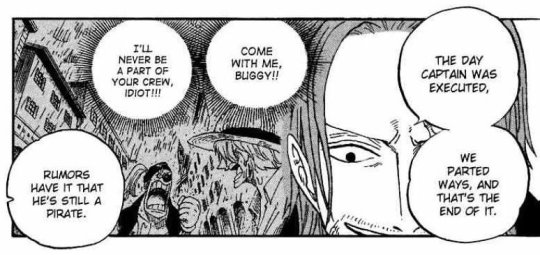
the thread was focusing on the way the speech bubble covers shanks's scar completely, and how it can be seen as a sign of vulnerability. oda is using shanks’s own words to hide his suffering, letting his physical scars be representative of his emotional ones, even though the event he’s talking about is completely unrelated to the way he got his scar.
in fact, we know shanks is not ashamed of the scar, since just a couple of pages after this one he mentions it directly as a way to start the conversation about blackbeard:
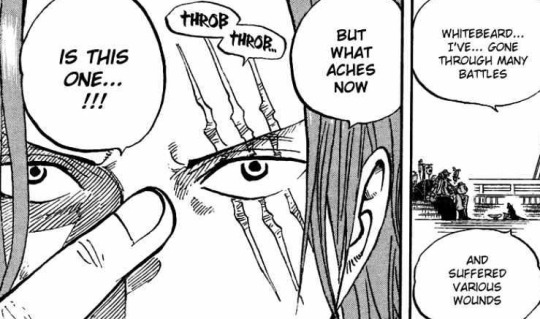
he doesn’t have a problem with the marking itself, it’s just used as a narrative device, a tool to highlight (in an extradiegetic way) his emotional wounds and the pain he always tries so hard to hide, in an effort to keep his usual composure.
the original author of the thread compared the panel from chapter 434 to another, way older one, from the very first chapter:
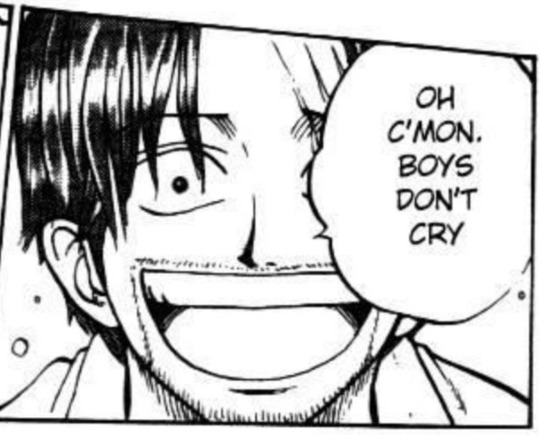
this takes place right after shanks loses his left arm to save luffy’s life. it’s obviously a very emotionally charged moment, which means the best thing to do would be showing a close-up of shanks’s reaction to everything that’s unfolding in front of him at that moment (luffy’s cries, or even his own reaction to his sacrifice). oda, however, chooses not to do that; instead, he hides half of shanks’s face, just like he did in chapter 434. the way the moment is portrayed tells the reader shanks is willing to hide his pain in an even deeper way than what he’s showing by smiling at luffy right after getting his arm chopped off.
it’s a great way to explain an important characteristic without stating it right away. it's a focal point of shanks's character: it's his way of showing luffy he cares about him and would much rather hide his suffering than pass it onto him, but it's also oda's way of conveying that shanks is much more vulnerable than what he allows himself to show.
having said that, the reason oda chose to bring back this framing in chapter 434 appears obvious: shanks misses buggy.
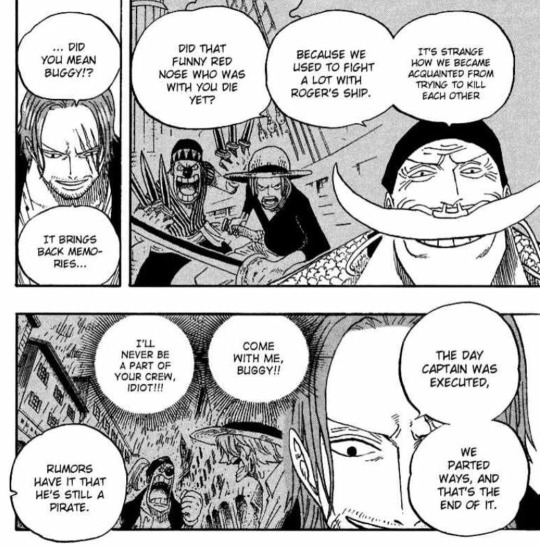
it’s plain to see, especially if we look at the whole page.
shanks tries so hard to act collected when talking about buggy, but it’s obvious that he’s hurting. his wording makes it clear he’s trying to detach from him (“that’s the end of it” + “rumors have it”); he acts like buggy doesn’t exist in his thoughts anymore, when it’s obvious he still does. he feels remorse, he regrets letting buggy go. he’s scared he might have been in the wrong. he knows he hurt buggy, but he desperately wishes he didn’t.
all of this weighs on him in a way he isn’t used to, so he locks these feelings up, thinking of them only in relation to something that happened in the past, and as so, stays in the past. he smiles while talking about him and buggy, but it’s a remorseful smile. he cuts the conversation short even though he vividly remembers what happened between them, and as he does so, his words hide the scar. he desperately tries to patch things up in his mind by exclusively clinging onto the good memories they share, but the remorse always creeps up on him. he always smiles when talking about buggy, even when he’s talking directly to him. but his smile always ends up looking sour.
this is exactly why i hate it when people say shanks doesn’t care about buggy. oda wouldn’t have given these panels so much depth if he didn’t want to show just how much shanks actually cares. even just the fact the panel we are focusing on directly mirrors a panel from the first chapter, one so important and impactful, should tell you everything you need to know.
buggy will always be shanks’s weakness. caring so much about someone when you’re a pirate of that caliber is difficult in itself, even more so when that someone is so far away from you now.
#one piece#shuggy#red haired shanks#buggy the clown#shanks#buggy#one piece meta#? i guess?#if you're the author of the original thread please PLEASE tell me so i can credit you properly!!!#fun fact: whitebeard mentions shanks's missing arm right after he's done talking about buggy. that's funny right#the fact oda chose to bring back That framing for shuggy is so positively insane to me#star yaps#i. still don't know how tumblr works
240 notes
·
View notes